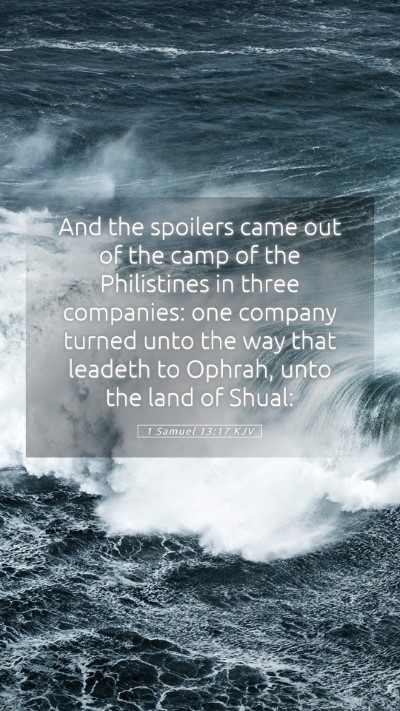Understanding 1 Samuel 13:17
This commentary on 1 Samuel 13:17 explores the significance of the verse, delving into Bible verse meanings, Bible verse interpretations, and its overarching relevance in Scripture. The verse states:
"And the spoilers came out of the camp of the Philistines in three companies: one company turned unto the way that leadeth to Ophrah, unto the land of Shual: another company turned the way to Bethhoron: and another company turned to the way of the border that looketh to the valley of Zeboim toward the wilderness."
Summary of the Verse
In this passage, we see the strategic movements of the Philistine army as they divided into groups to create a more effective assault on Israel. This military tactic not only highlights the urgency and intensity of the Philistine threat but also sets the stage for understanding Saul's challenges as Israel's newly appointed king.
Insights from Public Domain Commentaries
-
Matthew Henry's Commentary:
Henry emphasizes that the Philistines' approach reflects their boldness and the severity of Israel's predicament. The division of their forces signifies a coordinated effort against Israel, showcasing God's overarching sovereignty even in dire situations.
-
Albert Barnes' Notes:
Barnes highlights the strategic importance of this moment in the historical context of Israel’s battles. He notes how God often used external pressures, like the Philistines, to teach Israel reliance on Him. This verse reminds readers of the necessity of faith in God amidst overwhelming odds.
-
Adam Clarke's Commentary:
Clarke elaborates on the geographical references in the verse, noting how they lend authenticity to the narrative. He draws attention to the specific locations mentioned, indicating that they serve both as literal places and symbolic representations of Israel's spiritual and military struggles at the time.
Biblical Exegesis and Historical Context
The historical backdrop of 1 Samuel is crucial for understanding this verse. At this point, Israel is under threat from the Philistines, who were dominant in the region. The three companies mentioned in the verse illustrate a well-planned offensive strategy, indicating the seriousness of the threat Israel faced. The Philistines were known for their military prowess and innovation, especially in warfare technology, putting Saul in an exceedingly difficult position as the newly crowned king.
Spiritual Applications and Life Lessons
Even as we analyze 1 Samuel 13:17, it's essential to draw lessons applicable to modern life:
- The Importance of Preparedness: Just as Saul needed to prepare for the Philistine attack, believers are reminded to be prepared spiritually for the challenges life presents.
- Trust in God’s Sovereignty: The division of the Philistines can be seen as an encouragement that while threats may seem overwhelming, God's ability to intervene is limitless.
- Understanding Conflict: This verse aids in understanding that conflicts may serve a purpose in refining one's faith, illustrating the importance of reliance on divine wisdom.
Related Bible Cross References
- 1 Samuel 10:19: Discusses Israel's rejection of God as their king, setting the stage for the events leading to the conflict with the Philistines.
- 1 Samuel 13:6-7: Highlights the plight of the Israelites in fear and confusion before the Philistine army.
- 1 Samuel 14:20: Describes further military engagements between Israel and the Philistines and the importance of divine intervention during battles.
Conclusion
Through an in-depth Bible verse analysis of 1 Samuel 13:17, we uncover layers of meaning that enrich our Bible study insights. This verse not only narrates a significant historical moment but also invites readers to engage deeply with the text for personal and communal understanding.


